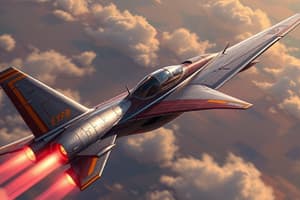Podcast
Questions and Answers
What is a key aspect of flight mechanics that involves the response of an aircraft to external forces during flight?
What is a key aspect of flight mechanics that involves the response of an aircraft to external forces during flight?
Which of the following contributes to the structural integrity of an aircraft?
Which of the following contributes to the structural integrity of an aircraft?
What phenomenon allows an aircraft to return to a predetermined flight condition after being disturbed?
What phenomenon allows an aircraft to return to a predetermined flight condition after being disturbed?
What role did early pioneers like the Wright brothers play in the evolution of modern aeronautics?
What role did early pioneers like the Wright brothers play in the evolution of modern aeronautics?
Signup and view all the answers
Which application of aeronautics primarily involves personal transportation and business use?
Which application of aeronautics primarily involves personal transportation and business use?
Signup and view all the answers
What is the primary function of lift in aerodynamics?
What is the primary function of lift in aerodynamics?
Signup and view all the answers
Which of the following statements about drag is true?
Which of the following statements about drag is true?
Signup and view all the answers
Which propulsion system uses combustion to accelerate exhaust gases?
Which propulsion system uses combustion to accelerate exhaust gases?
Signup and view all the answers
What role do airfoil shapes play in aircraft design?
What role do airfoil shapes play in aircraft design?
Signup and view all the answers
The center of gravity (CG) is important for which aspect of flight?
The center of gravity (CG) is important for which aspect of flight?
Signup and view all the answers
Which of the following materials is commonly used in aircraft structures for its strength-to-weight ratio?
Which of the following materials is commonly used in aircraft structures for its strength-to-weight ratio?
Signup and view all the answers
What is the primary goal of aeronautics?
What is the primary goal of aeronautics?
Signup and view all the answers
Which propulsion system combines a turbine engine with a propeller?
Which propulsion system combines a turbine engine with a propeller?
Signup and view all the answers
Study Notes
Introduction to Aeronautics
- Aeronautics is the science and art of designing, building, and operating aircraft.
- It encompasses a broad range of disciplines, including aerodynamics, propulsion systems, structures, and flight mechanics.
- The goal of aeronautics is to create vehicles that can fly and accomplish various tasks.
- Aeronautics deals with the principles and applications of flight, applying these to aircraft.
Aerodynamics
- Aerodynamics is a branch of fluid mechanics focusing on air motion and its interaction with solid surfaces, primarily aircraft.
- Key concepts include:
- Lift: The force opposing gravity, enabling flight. Created by pressure differences above and below the wing.
- Drag: The force resisting flight, categorized as parasite drag, induced drag, and interference drag.
- Thrust: The propulsive force, typically generated by engines.
- Centre of Gravity (CG) and Centre of Pressure (CP): Crucial for aircraft balance and stability in flight.
- Bernoulli's principle relates fluid velocity and pressure. Other fluid dynamics principles inform aircraft design optimization.
- Airfoil shapes are vital for lift generation and flight control. Shape optimization improves efficiency and reduces drag.
Aircraft Propulsion Systems
- Aircraft propulsion primarily relies on engines.
- Common propulsion systems include:
- Jet engines using combustion to accelerate exhaust.
- Turboprops combining a turbine engine and propeller.
- Piston engines, common in smaller aircraft, converting chemical energy to rotational energy for propellers.
- Rockets accelerating exhaust for high-speed flight.
- Key functions in aeronautical engineering include understanding these systems, ensuring fuel efficiency, and maintaining reliability.
Aircraft Structures
- Aircraft structures must be strong, lightweight, and durable to withstand flight forces.
- Common structural materials include:
- Metal alloys for their strength-to-weight ratio.
- Composites for enhanced structural integrity and reduced weight.
- Advanced aerodynamic designs directly affect structural requirements and aircraft design. Stress analysis and material science ensure structural integrity for safety.
Flight Mechanics
- Flight mechanics studies aircraft behavior in flight.
- Key aspects include:
- Stability: The tendency for an aircraft to return to a predefined flight condition after a disturbance.
- Control: The ability to maneuver the aircraft using controls like ailerons, elevators, and rudders.
- Flight dynamics: The study of how aircraft respond to forces during flight.
- Knowledge of these principles influences control surface design and overall aircraft configuration.
History of Aeronautics
- Early flight attempts and pioneers like the Wright brothers significantly shaped modern aeronautics.
- The history of aeronautics shows advancements driven by scientific discoveries.
- Progress in materials, propulsion systems, and aerodynamics led to more efficient and safer flight.
Applications of Aeronautics
- Commercial aviation connects people globally.
- Military aviation supports national defense and exploration.
- General aviation serves personal and business transportation.
- Space exploration utilizes rockets and related technologies for space travel.
- Racing and recreational activities utilize aeronautical principles.
Studying That Suits You
Use AI to generate personalized quizzes and flashcards to suit your learning preferences.
Description
This quiz covers the fundamental principles of aeronautics, including the design, construction, and operation of aircraft. It specifically focuses on aerodynamics, exploring essential concepts such as lift, drag, and thrust. Test your knowledge on how these forces interact to enable flight and the overall science of aircraft performance.




